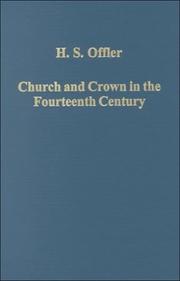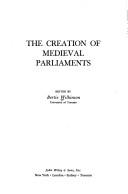| Listing 1 - 10 of 33 | << page >> |
Sort by
|
Book
ISBN: 8388857037 9788388857034 Year: 2001 Volume: 95 Publisher: Kraków: Polskiej akademii umiejętności,
Abstract | Keywords | Export | Availability | Bookmark
 Loading...
Loading...Choose an application
- Reference Manager
- EndNote
- RefWorks (Direct export to RefWorks)
Book
ISBN: 3799568638 9783799568630 Year: 2005 Volume: 63 Publisher: Ostfildern Thorbecke.
Abstract | Keywords | Export | Availability | Bookmark
 Loading...
Loading...Choose an application
- Reference Manager
- EndNote
- RefWorks (Direct export to RefWorks)
Multi
ISBN: 9781783272525 178327252X 9781787440791 1787440796 Year: 2017 Publisher: Woodbridge The Boydell Press
Abstract | Keywords | Export | Availability | Bookmark
 Loading...
Loading...Choose an application
- Reference Manager
- EndNote
- RefWorks (Direct export to RefWorks)
In the medieval world, what happened when a figure of recognised authority was absent? What terminology, principles and solutions of proxy authority were developed and adopted? Did these solutions differ and change over time depending on whether the absence was short or long and caused by issues of incapacity, minority, disputed succession, geography or elective absenteeism? Did the models of proxy authority adopted by ruling dynasties and large institutions influence the proxy choices of lesser authority? The circumstances and consequences of absentee authority, a major aspect of the systems of medieval power, are the focus of this volume. Ranging across the realms of medieval Europe (but with a focus upon the British Isles and France), its essays embrace a wide variety of experience - royal, parliamentary, conciliar, magnatial, military, ecclesiastical (papal to parochial), burghal, household, minor or major, male or female, exiled, captive or infirm - and explore not merely political developments, but the dynastic, diplomatic, financial, ideological, religious and cultural ramifications of such episodes. Frédérique Lachaud is Professor of medieval history at the Université de Lorraine, France; Michael Penman is Senior Lecturer in history at the University of Stirling, Scotland. Contributors: James Bothwell Michelle Bubenicek, Léonard Dauphant , Bruno Dumézil, Laurent Hablot, Torsten Hiltmann, Tom Horler-Underwood, Robert Houghton, Olivier de Laborderie, Frédérique Lachaud, Hans Jacob Orning, Michael Penman. Norman Reid
History of Europe --- anno 500-1499 --- Politics and government. --- 476-1492. --- Europe --- Europe. --- Politics and government --- --Politique et gouvernement --- --Moyen âge, --- Civilization, Medieval. --- Civilisation médiévale. --- Middle Ages. --- Moyen âge --- Leadership --- History --- Politique et gouvernement --- Moyen âge, 476-1492 --- Europe - Politics and government - 476-1492 --- Europe-Politics and government-476-1492. --- HISTORY / Medieval. --- Civilisation médiévale. --- Moyen âge

ISBN: 0860788202 9780860788201 Year: 2000 Volume: CS692 Publisher: Aldershot ; Singapore ; Sydney Ashgate
Abstract | Keywords | Export | Availability | Bookmark
 Loading...
Loading...Choose an application
- Reference Manager
- EndNote
- RefWorks (Direct export to RefWorks)
Church and state --- History --- Europe --- Politics and government --- Church history --- 476-1492 --- 600-1500 --- Church and state - Europe - History --- Europe - Politics and government - 476-1492 --- Europe - Church history - 600-1500
Book
ISBN: 3412210056 9783412210052 Year: 2006 Volume: Heft 60 Publisher: Köln Böhlau
Abstract | Keywords | Export | Availability | Bookmark
 Loading...
Loading...Choose an application
- Reference Manager
- EndNote
- RefWorks (Direct export to RefWorks)
Symbolism in politics --- Lions. --- Symbolisme en politique --- Lion --- History --- Histoire --- Europe --- Politics and government --- Politique et gouvernement --- Lions --- Lion. --- Symbolism in politics - Europe --- Europe - History - 476-1492 --- Europe - Politics and government - 476-1492
Book
ISBN: 2130456227 9782130456223 Year: 1993 Publisher: Paris : Presses universitaires de France,
Abstract | Keywords | Export | Availability | Bookmark
 Loading...
Loading...Choose an application
- Reference Manager
- EndNote
- RefWorks (Direct export to RefWorks)
State, The --- Etat --- History --- Histoire --- Europe --- Constitutional history, Medieval --- Histoire des institutions --- --XIVe-XVe s., --- Kings and rulers --- Politics and government --- Europe - Kings and rulers --- XIVe-XVe s., 1301-1500 --- Europe - Politics and government - 476-1492
Book
ISBN: 2130438806 9782130438809 Year: 1991 Volume: vol *14 Publisher: Paris : PUF - Presses Universitaires de France,
Abstract | Keywords | Export | Availability | Bookmark
 Loading...
Loading...Choose an application
- Reference Manager
- EndNote
- RefWorks (Direct export to RefWorks)
Europe --- Politics and government --- Politique et gouvernement --- Constitutional history, Medieval --- Histoire des institutions --- --XIVe-XVe s., --- Kings and rulers --- Middle Ages. --- Kings and rulers. --- 476-1492 --- Europe - Kings and rulers --- XIVe-XVe s., 1301-1500 --- Europe - Politics and government - 476-1492 --- EUROPE OCCIDENTALE --- CIVILISATION OCCIDENTALE --- CIVILISATION --- POLITIQUE ET GOUVERNEMENT --- 14E-15E SIECLES
Book
ISBN: 9782701802862 2701802865 Year: 2010 Volume: *8 Publisher: Paris : De Boccard,
Abstract | Keywords | Export | Availability | Bookmark
 Loading...
Loading...Choose an application
- Reference Manager
- EndNote
- RefWorks (Direct export to RefWorks)
Gouverner par l'enquête, c'est avant tout déambuler et visiter pour connaître et se faire reconnaître, pour réformer aussi. Ce sont là des pratiques administratives qui connurent aux XIIIe et XIVe siècle un grand développement dans nombre de principautés d'Occident. Elles recèlent il est vrai des enjeux idéologiques majeurs, quand le prince chrétien se croyait comptable devant le roi du Ciel non seulement de ses propres actes, mais aussi de ceux de ses officiers, et que sa légitimité en dépendait largement. Enquêter, c'est aussi faire dire, et en l'occurrence donner au pouvoir l'apparence d'une sujétion consentie. Aussi l'enquête générale concourt-elle à façonner la certaine science du souverain et sa connaissance d'un espace politique. Elle s'inscrit dans un processus de rationalisation du gouvernement des hommes et des choses. C'est qu'elle repose sur toutes les méthodes rationnelles et comptables d'établissement de la vérité reconnues à l'époque. L'enquête générale est un moment essentiel du développement de l'État médiéval, elle est aussi le symptôme de ses propres limites. Les contributions ici rassemblées s'efforcent de dresser l'état des lieux de ce vaste chantier et de proposer quelques pistes de réflexion et voies comparatives.
Civilization, Medieval --- Civilization, Western --- Surveys --- Political aspects --- History --- Europe --- Politics and government --- Conferences - Meetings --- Enquêtes publiques --- Europe de l'Ouest --- Politique et gouvernement --- Civilization, Medieval - Congresses --- Civilization, Western - Political aspects - History - To 1500 - Congresses --- Surveys - History - To 1500 - Congresses --- Europe - Politics and government - 476-1492 - Congresses --- Enquêtes publiques

ISBN: 0471946192 9780471946199 Year: 1972 Publisher: New York (N.Y.): Wiley
Abstract | Keywords | Export | Availability | Bookmark
 Loading...
Loading...Choose an application
- Reference Manager
- EndNote
- RefWorks (Direct export to RefWorks)
Constitutional history, Medieval --- Legislative bodies --- History --- Europe --- Politics and government --- -Constitutional history, Medieval --- Bicameralism --- Legislatures --- Parliaments --- Unicameral legislatures --- Constitutional law --- Estates (Social orders) --- Representative government and representation --- Legislative power --- Council of Europe countries --- Eastern Hemisphere --- Eurasia --- -Legislative bodies --- Legislative bodies - Europe - History --- Europe - Politics and government - 476-1492
Book
ISBN: 3770548914 9783770548910 3846748919 9783846748916 Year: 2010 Volume: 22 Publisher: München : Wilhelm Fink,
Abstract | Keywords | Export | Availability | Bookmark
 Loading...
Loading...Choose an application
- Reference Manager
- EndNote
- RefWorks (Direct export to RefWorks)
"Völker, Reiche und Namen stehen als Marksteine des Übergangs von der Spätantike zum frühen Mittelalter im Zentrum dieses Bandes. Dabei werden Fragen bezüglich der Bedingungen von Staatlichkeit und der Identität der Völker sowie verschiedene Faktoren, die auf die eichsbildungen einwirkten, wie z.B. Eliten, Legitimationsstiftung, Akkulturation, Christianisierung, untersucht und diskutiert."--P. [4] of cover.
Germanic peoples --- Middle Ages --- Civilization, Medieval --- History --- Migrations --- Europe --- Politics and government --- Germanic tribes --- Ethnology --- Indo-Europeans --- Teutonic race --- Council of Europe countries --- Eastern Hemisphere --- Eurasia --- Germanic peoples - History - Congresses --- Germanic peoples - Migrations - Congresses --- Middle Ages - Congresses --- Civilization, Medieval - Congresses --- Europe - History - 392-814 - Congresses --- Europe - Politics and government - 476-1492 - Congresses
| Listing 1 - 10 of 33 | << page >> |
Sort by
|

 Search
Search Feedback
Feedback About UniCat
About UniCat  Help
Help News
News